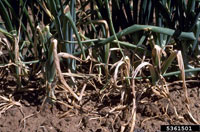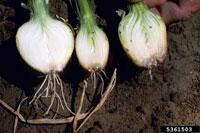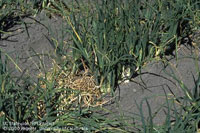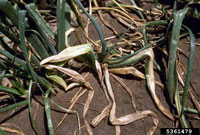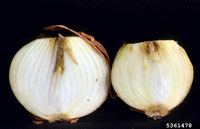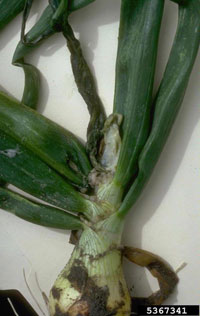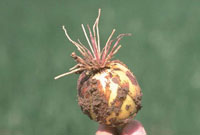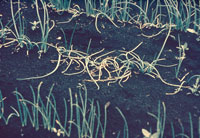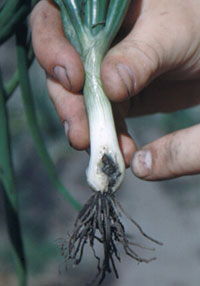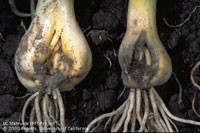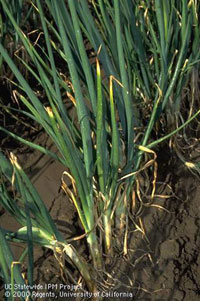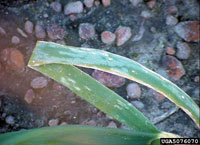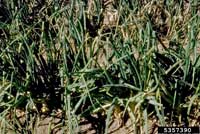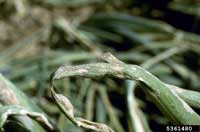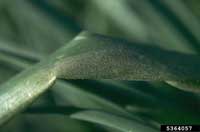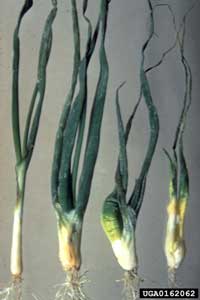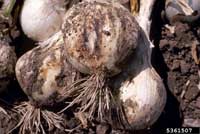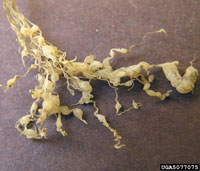Extension > Garden > Diagnose a problem > What's wrong with my plant? > Vegetable > Onion > Leaves yellow then wilt
Onion > Leaves > Leaves yellow then wilt
1 of 9
Fusarium basal rot
Fusarium oxysporum f.sp. cepae
- Leaves turn yellow to brown from the tip down and wilt
- Onion bulb has watery brown decay starting at the base and extending up into the bulb
- Roots are rotted or absent and the bulb is often easily pulled from the ground
- A white fuzzy growth can often be seen on the rotted basal plate
- More information Fusarium Basal Rot
2 of 9
White rot
Sclerotium cepivorum
- In severely infected plants, leaves may be stunted, yellow from the tip down, and die
- Bulb has white, fluffy fungal growth
- Small, hard, black poppy seed like fungal structures form on infected bulbs
- More information White Rot
3 of 9
Soft rot
Erwinia carotovora pv. Carotovora
- Leaves of onions become pale and wilt
- One or several bulb scales may appear water soaked, gray and soft
- The entire bulb may be soft and watery
- A foul smell may be present
- Common on plants injured by onion maggot or other means
- Disease develops in warm wet weather, often at the end of the season
- More information on Soft Rot
4 of 9
Pink root
Phoma terrestris
- Leaves turn yellow with a reddish tinge from the tip down due to root damage
- Sunken dark pink to maroon areas on roots
- Infected roots break off easily
- Plants are stunted and may produce no to very small bulbs
- Commonly occurs mid to late season, in areas with poor soil
- More information on Pink Root
5 of 9
Onion maggot
Delia antiqua
- Onions yellow and wilt, sometimes rapidly
- Holes in onion bulbs are present
- Maggots may be present; they are carrot-shaped, legless, and cream colored
- More information on Onion Maggot
6 of 9
Botrytis leaf blight
Botrytis squamosa
- Leaves develop small white circular to elliptical spots surrounded by a light green to silvery white halo
- Centers of the spots usually become sunken, straw colored, and may break apart in a lengthwise slit
- Bulbs are not directly infected but may be smaller on plants with severe leaf damage
- In cool (54-75F) wet weather, disease develops rapidly, entire plants dieback starting with the oldest leaves first
- More information on Botrytis Leaf Blight
7 of 9
Downy mildew
Peronospora destructor
- Leaves develop elongated pale green to tan spots
- Purplish gray fuzzy growth develops on leaves
- Severely infected leaves collapse and die
- Plants may produce small bulbs
- Disease is most severe in cool wet weather
- More information Downy Mildew
8 of 9
Stem and bulb nematode
Ditylenchus dipsaci
- In severe infestations, plant may wilt and die
- Leaves are twisted and stunted
- Bulbs are often desiccated and light weight, secondary rot organisms like soft rot may invade and rot the bulb
- Outer layer of bulb is split or has cracks
- More information on Stem and Bulb Nematode
9 of 9
Northern root knot nematode
Meloidogyne hapla
- Onion plant is stunted, leaves yellow and die early in the season
- Roots have small round galls
- Onion bulbs are unaffected but small when roots are severely infected
- More information Northern on Root Knot Nematode



